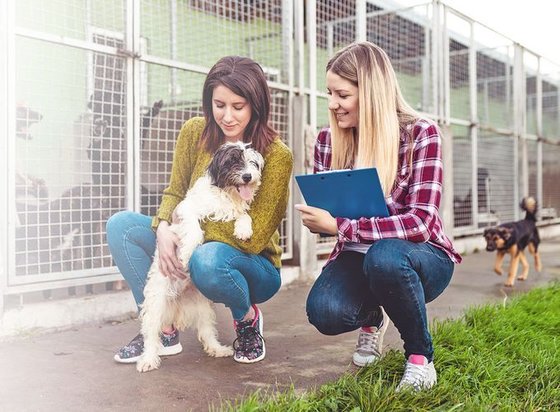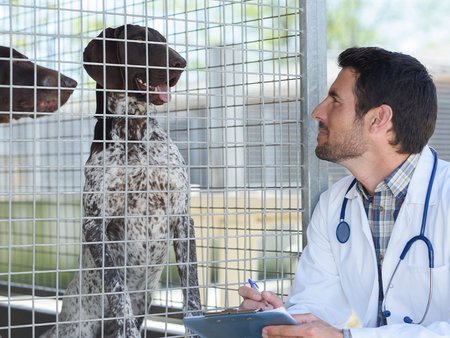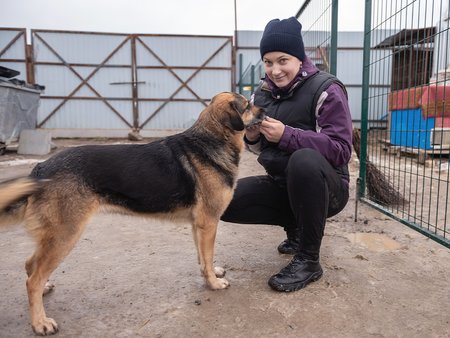8 Advantages of Adopting a Dog from a Rescue
Share
There are numerous compelling reasons to consider adopting a dog from a rescue. Here, you'll discover essential factors to ponder before welcoming a four-legged friend into your life.

Common Reasons for Giving a dog up
Most dogs find themselves in rescue organisations not due to any shortcomings but because their owners' circumstances have changed. The most typical reasons for surrender include job changes, relocations, separations, and illnesses. This means that many loving dogs must leave their families through no fault of their own and temporarily reside in a rescue. If you're contemplating providing a dog with a new home, take time to reflect on your vision of a furry companion and your overall living conditions.
Lets explore 8 reasons why everyone should consider adopting from a dog rescue:
1. For the love of animals
Choosing to adopt a dog from a rescue is a meaningful step towards animal welfare. Many prospective pet owners opt for rescue dogs out of their deep love for animals. By adopting a rescue dog, you're offering an animal a second chance at a better life. Moreover, you help alleviate the strain on overcrowded and overwhelmed rescue organisations that not only take in surrendered animals but also rescue found or improperly kept animals. Some animal protection associations even facilitate international adoptions, placing animals in caring homes worldwide. If animal welfare is close to your heart, a rescue or an animal protection organisation is a fantastic starting point to find a compatible furry friend.
2. Adoption Support
When considering adopting a dog from animal protection or a rescue, you have the opportunity to visit and spend time with your prospective furry family member beforehand. You can engage in activities like walking and bonding with the dog. If the dog has been at the rescue for an extended period, the rescue's caregivers can provide valuable insights, advice, and support. From dietary needs to grooming preferences and behaviour, they offer guidance and accompany you throughout the adoption process. This allows for a thorough understanding of your new dog and ensures a smooth transition into your home.

3. Veterinary Care
Upon arrival at the rescue, all dogs undergo comprehensive veterinary examinations, receive microchips, and are vaccinated. They are also treated for parasites and, if necessary, spayed or neutered. Health assessments are conducted for every animal as needed. If any medical issues arise, they are promptly addressed at the rescue, and the dog is only available for adoption after receiving necessary veterinary care. In the case of chronic illnesses or required surgeries, rescue staff will provide you with information about the dog's health and guidance on further treatment and medication. This ensures transparency from the outset, allowing you to understand potential costs.
4. Cost Savings
Adopting a dog from a rescue typically involves a nominal fee, covering a portion of the rescue's expenses. In contrast, purchasing a dog from a breeder, especially a specific breed, can be considerably more expensive. However, the primary focus should be on the compatibility of the dog with your lifestyle rather than the price.
5. Avoiding Unscrupulous Breeding Practices
Online pet sales often feature various animals, both mixed breeds and purebreds, at enticing prices. Unfortunately, this can also lead to encounters with dubious breeders. When you choose to adopt from a rescue, you eliminate the risk of engaging with unscrupulous pet dealers and potentially acquiring a sick animal.
6. Finding the Right Fit
When selecting the perfect dog for you, focus on compatibility in terms of temperament and character rather than factors like size, gender, colour, or breed. For instance, a lively terrier mix may be more suitable for experienced dog owners, while an active Border Collie might be the right choice for someone who enjoys outdoor activities. With mixed breeds, individual character traits take precedence. Your level of activity, experience with dogs, and time available for training should guide your decision. The ultimate goal is for both you and your new canine companion to form a harmonious partnership under one roof.

7. A Deliberate Decision
Adopting or purchasing a pet should be a well-considered decision. Impulsive pet purchases can lead to unintended consequences. The rescue adoption process differs in that it discourages impulse decisions. It involves a more extended period of getting to know the dog, ensuring compatibility with your lifestyle, and the dog's well-being. The goal is for both the rescue dog and the owner to establish a strong bond and find happiness under the same roof.
8. Pedigree Puppies vs. Rescue Dogs
When you purchase a purebred dog from a breeder, you typically bring home a puppy. This phase involves intensive training, including housebreaking, separation training, basic commands, and obedience training. On the other hand, adopting an adult rescue dog means they may already have learned some fundamental rules for living with humans and other dogs. While bonding and adjustment will be necessary in the initial days following adoption, adult rescue dogs tend to be calmer and less active than puppies, making them a suitable choice for various households, especially for older individuals.
In summary, the decision to adopt or purchase a pet should be a thoughtful one. Impulse decisions can lead to unforeseen challenges. Rescues prioritise the careful matching of dogs and owners, ensuring a successful and fulfilling adoption process.



